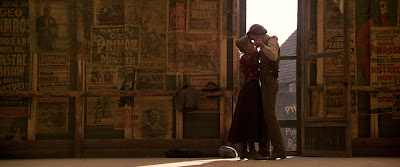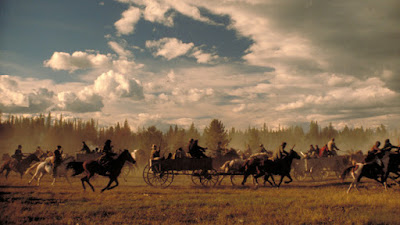The best sequence in Michael Cimino’s infamously Brobdingnagian epic “Heaven’s Gate” (1980) is the dance at a roller-skating rink. “It’s a visual, honey,” to quote Tracey Ullmann in “Small Time Crooks” (1999) speaking of a decorative harp. “The sweep kills me.” And this sequence’s sweep is monumental, sweeping you up, up, and away to 1890 Wyoming. The scene ends with Marshal Jim Averill (Kris Kristofferson) sharing a dance on skates with local madam Ella (Isabelle Huppert), and when the dance itself concludes, he acknowledges the fiddler across the way (David Mansfield, who composed the score) who keeps on fiddling as the lovers depart. I like that touch. In a movie where human beings frequently feel secondary to the landscapes and compositions, you can imagine the fiddler continuing to play even after the camera cuts away, playing just for himself. It also feels like an apt metaphor for Cimino himself: fiddling while Rome – or, in this case, United Artists – burns. The “Heaven’s Gate” production, in which Cimino, burning through every cent of his “Deer Hunter” (1978) capital, sunk his creatives-forward studio, helped give the industry cause to tamp down future auteur power, and turned his own movie title into an adjective for boondoggle, has been written and bandied about so much that rather than try and summarize it myself I will let Adam Nayman of The Ringer summarize it instead: “The irony of a company forged out of the bonds of creative solidarity being undone by a director run amok is potent verging on mythic.”
In that same piece, Nayman argues that “(t)oo much was risked, lost, or straight-up immolated” in the production and aftermath of “Heaven’s Gate” to evasively “take a middle position” regarding its quality. That is why you tend to see it either elevated to the level of masterpiece, as The Criterion Collection has essentially done by providing space in its library for a restored transfer of Cimino’s 216-minute cut, with an accompanying essay by Giulia D’Agnolo Vallan in a roundabout way equating the movie with nothing less than Melville’s Moby-Dick, or such an appalling cinematic affliction that “you want to deface (it),” to quote patron saint of the pan Pauline Kael from the time of its release, “you want to draw moustaches on it,” a more innovative way of deeming it “an unqualified disaster,” as Vincent Canby, which is maybe the only time Kael and Canby agreed on anything? I am compelled by Nayman’s reasoning, and yet, watching “Heaven’s Gate” for the first time in a long time, I found myself dragged back to the middle position.
Cimino connects his title and its meaning to the immigrants of the American West and the war that erupted in Johnson County between them and the cattle barons of the Wyoming Stock Growers Association, though the plot can often feel beside the point in the face of the production. That production was notoriously laborious, if not outright tyrannical, and whether the director’s extreme methods were truly worth it, I don’t know, but man, this is just about the most impeccably crafted movie I can recall. The costume design, certainly, and the cinematography, dear god yes, but I’m talking about everything, right down to the sound design, to how the China coffee cups and plates clink and the way pool balls collide. I can’t really describe or explain it, couldn’t hope to, but the bubbling of the whiskey when it is dispensed is melodious, a signifier of how everything comes across bigger than life. That’s true straight away in the 20-minute prologue, set 20 years back east at the Harvard graduation of future Marshal Averill. Discerning viewers, though, will notice this sequence was shot not in Cambridge but at Oxford, as if even Harvard itself wasn’t good enough as Harvard for the grandiloquent vision of Cimino.
Craft services are only half the battle, however, and while those are as good as they get, there is a distinct dramatic inertia that causes a viewer to feel the bruising weight of that colossal run time. Even Tim Brayton’s positive present-day notice concedes that “Heaven’s Gate” “has about 35 minutes of plot stretched across (its) 217 minutes,” though lacking story, really, is less of a problem than how the central relationships, an emergent love triangle between Averill and Ella and Nate Champion (Christopher Walken), a killer hired by the cattle barons to help eradicate their immigrant problem, effuses no heat or complexity, Jim’s backstory of privilege never movingly or satisfactorily congeals with his protection of the immigrants while the immigrants themselves are repeatedly reduced to merely a virtual mob. There is “no hint of anything resembling direct knowledge,” Kael cruelly but accurately observed, “or even intuition of what people are about,” Cimino’s entire attitude toward the humanity onscreen boiled down to the striking image of billowing steam from a train engine entirely ensconcing someone, I forget who, appropriately.
Craft services are only half the battle, however, and while those are as good as they get, there is a distinct dramatic inertia that causes a viewer to feel the bruising weight of that colossal run time. Even Tim Brayton’s positive present-day notice concedes that “Heaven’s Gate” “has about 35 minutes of plot stretched across (its) 217 minutes,” though lacking story, really, is less of a problem than how the central relationships, an emergent love triangle between Averill and Ella and Nate Champion (Christopher Walken), a killer hired by the cattle barons to help eradicate their immigrant problem, effuses no heat or complexity, Jim’s backstory of privilege never movingly or satisfactorily congeals with his protection of the immigrants while the immigrants themselves are repeatedly reduced to merely a virtual mob. There is “no hint of anything resembling direct knowledge,” Kael cruelly but accurately observed, “or even intuition of what people are about,” Cimino’s entire attitude toward the humanity onscreen boiled down to the striking image of billowing steam from a train engine entirely ensconcing someone, I forget who, appropriately.
But oh my god that image of billow steam from a train engine entirely ensconcing someone! You can imagine it as a French Impressionist painting, one strikingly chalking up the obsolescence of man to the progress of man, just as you can imagine all those naturally lit interiors as a Caravaggio painting, some semblance of brightness in a hardscrabble world, just as Cimino’s recurringly epic canvasses of mammoth, pristine locations towering over the masses of people and fields of blood exist as both a kind of moving picture book of the Louvre Red Rooms, paintings as movie screens, and how the west, as they say, was so brutally won. That might sound more art school than film school but it’s hard to deny each impeccably crafted image’s power, conjuring up “the American West as heartbreaking promise,” to quote Vallan, an embodiment of Cimino’s ultimate creation itself.






No comments:
Post a Comment